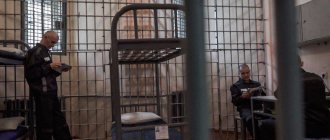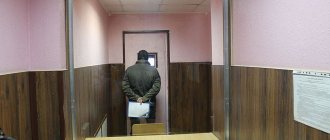Often, the entire process of investigating a crime takes a fairly long period of time. To prevent a suspect from escaping during this period of time, law enforcement officers and investigators can protect the person from the outside world by placing him under protective custody in a pre-trial detention center.
It is for this reason that many citizens have a question about what is the maximum period of detention, and how it is correctly calculated before a court verdict is made.
Download for viewing and printing:
Article 109. Terms of detention of the Criminal Procedure Code of the Russian Federation
Duration of detention of the accused in a pre-trial detention center
The Code of Criminal Procedure determines the total period of detention of an accused person in a pre-trial detention center for the period of activities related to the stage of preliminary investigation of the case. At the moment, the maximum period of stay in such conditions is 2 months.
However, the legislation also provides for the possibility of extending this period for a certain period of time. In particular, if investigators or other authorized persons need to familiarize the accused with the case materials, but they no longer have time for this.
Important! In such a situation, the materials must be transferred to the person no later than 30 days before the expiration of the accused’s stay in such a specialized institution.
General terms
The internal regulations of the pre-trial detention center (Rules - below) were approved by order of the Ministry of Justice of the Russian Federation No. 189 of October 14, 2005.
The introductory part of the Rules specifies the principles of organizing temporary detention facilities for arrested persons and suspects. They are:
- respect for the rights of suspects and their isolation from society;
- organization of an acceptable mode of existence;
- performing tasks related to the investigation of crimes and making a fair decision by the court.
Hint: implementation of the Rules is entrusted to the administration of the institution and the people contained in it.
For violation of regulations, both parties may be punished. The document describes all the processes to which the suspect is subjected. The rules are prohibited from breaking. The work of pre-trial detention center employees is subject to state supervision. This function is assigned to the prosecutor's office.
Download for viewing and printing:
Order of the Ministry of Justice of the Russian Federation No. 189 of October 14, 2005
Contents of the accused: pre-trial, trial stage of proceedings
Pre-trial stage of proceedings
According to the norms established by criminal procedural legislation, the calculation of the period during which the accused during the period of investigative measures begins from the moment the person is taken into custody and until the prosecutor authorized to supervise the correctness of the consideration of this case submits all documents to the court .
The terms of detention of an accused person in a pre-trial detention center also include:
- The time during which the person was in a pre-trial detention center as a suspect.
- Time for house arrest.
- The time during which a person was forced to stay in a specialized medical institution, where he received care in a hospital setting, if such a referral was received in court.
- The period of time during which the accused was in the territory of another state, where a request for his extradition to the Russian Federation or the provision of legal assistance was awaiting.
The administration of a specialized institution must ensure that judges, prosecutors, investigators and other persons conducting proceedings in the case have the opportunity to freely visit the pre-trial detention center during the working day to interview the accused, receive him and deliver him to undergo various types of investigative measures.
Attention! The prosecutor, who is authorized to supervise the investigation of a criminal case, and senior officials who monitor the correctness of the activities, also have the right to call a person.
On the written instructions of the person authorized to conduct an inquiry or other investigative measures, the administration of the pre-trial detention center must ensure the following conditions:
- Provide properly equipped premises.
- Deliver the suspect to the place of investigative measures and ensure his security.
- Ensure access to the institution for persons who will take part in investigative activities.
- Be present during the search of the suspect, the seizure of his personal belongings, the seizure of property, and their transfer to the institution’s warehouse.
Judicial investigation stage
The accused, who is imprisoned in a pre-trial detention center, has every right to take part in investigative activities, as well as any research organized by the court.
If the prosecutor believes that the remaining term of imprisonment is not enough for the court to make a decision on the guilt of a person and the preventive measure applied to him, then the term of confinement of the accused in a pre-trial detention center can be extended to 30 days.
This period is set aside to enable the court to conduct a preliminary hearing on the case or the trial itself, send the case to another court according to the rules of jurisdiction, and make a decision regarding the accused. The latter, in turn, has the right to attend all court hearings and express his position.
Stage to the men's colony: how to prepare for it and what to expect
The convicted person will not be taken to the place where he is serving his sentence immediately, but only after the court receives a certificate from the pre-trial detention center confirming that the sentence has entered into legal force. After receiving such a certificate, the convict is required to be sent to a colony at the first stage.
Usually the stages are completed at a certain frequency, often well known to those who have been in pre-trial detention for a long time, so if there is such a possibility, it would be good to make inquiries. However, it is not profitable for the FSIN officers to send each prisoner in a separate stage, and therefore there is a practice of waiting until a sufficient number of prisoners are collected for transportation in order to send everyone at the same time.
While waiting for the “big” stage, the convict is in limbo, because it is almost impossible to accurately calculate the moment of departure. In this regard, it is better to prepare for the stage immediately after the verdict comes into force and have things collected in your bag and a supply of food for the trip: tea, coffee, instant noodles, sugar, condensed milk, mayonnaise.
You should not take more than two bags and overload them: it will be difficult to carry them over long distances from paddy wagons to carriages, along long corridors and between prison floors. In addition, upon arrival for transfer, the convict will also be given a rolled-up mattress (it weighs a lot and is uncomfortable to hold) with bed linen, a plate, a mug and a spoon. If you have even two bags, it’s very difficult to drag it all to the camera at once, and most likely you won’t be allowed to go back and forth twice. Therefore, it is better to put a plate, a mug, a spoon into an unfolded mattress, twist it as tightly as possible and tie one of the sheets twisted into some kind of rope, holding it like a handle, this kind of trunk can be carried.
In some colonies and prisons, new arrivals are not given plates, mugs and spoons - forks are strictly prohibited - as are all steel cutlery. Therefore, it makes sense to take with you reusable plastic dishes, a plastic spoon and a knife just in case.
The convict, who must be transferred, is taken out of the cell early in the morning before the time of rising and taken to special rooms - “settling tanks”, where people are collected before being transported anywhere. Personal search and search of bags is a mandatory procedure before departure. Searches will take place every time a convicted person enters and leaves transit prisons along the entire route, as well as when loading into the so-called. “Stolypin carriage” is a railway carriage for transporting convicts. Before convicts are loaded into paddy wagons to be transported to the railway station and placed in wagons, they are given boxes of dry rations. It usually includes several soups, porridge, tea, jelly, unleavened biscuits, two types of disposable cups - large and small.
During the phase, no one separates prisoners depending on the severity of the crimes they committed and the regime of detention. Thus, a person convicted of repeated murder who is subject to a strict regime for 15 years and a person who has evaded paying alimony and is going to a general regime for 6 months can refuse together. It’s better to try to get into the same paddy wagon, the same carriage, the same cell in a transit prison with those whom you know at least a little, with whom you sat in the same cell in a pre-trial detention center and had normal relations. This provides additional moral and physical support.
You shouldn’t take various horror stories from “experienced” prisoners to heart. They can be greatly exaggerated, and have the purpose of demonstrating their awareness of prison life and raising their importance in the eyes of other convicts. There are also true stories, but one must also understand that the colonies are different everywhere and the experience of being in some can be very far from the experience of being in others.
Before the stage, it is undesirable to eat and drink a lot, since there will often be nowhere to go to the toilet. FSIN employees will not stop the car and let the prisoner out to go to the toilet. When transporting in wagons, the situation is similar. When the train is at a station, or the carriage is left overnight at a dead end, you are not allowed to go to the toilet - a sanitary zone. They are fed on the road by pouring boiling water from a kettle three times a day. After some time, one by one they are taken out of the cell compartments to the toilet. Therefore, you also need to drink carefully, realistically assessing the body’s capabilities in order to endure until the next “walk”. You have to take turns sleeping, so it’s better to distribute the order in advance. Those sent do not have watches.
It can be very cold in the carriage in winter and very hot in summer. There are no windows in the compartment itself. On the corridor side, the windows are transparent only in the upper part, where the vents are located. If security closes them all, it becomes very stuffy. The situation is aggravated by the factor of widespread smoking, which, in the absence of ventilation and fresh air, makes breathing very difficult. In a compartment where 4 people are accommodated in a regular carriage, in a carriage for convicts there are up to 12, plus things in three tiers.
The stage can take from several days to several weeks, and all this time, according to the tradition that has developed since the days of the Gulag, neither the prisoner himself nor his relatives are informed where he is being taken and when he will be able to get in touch. You need to be prepared for this.
If the distance to the camp is significant, then the convicts are transported from prison to prison and placed in transit cells, which differ significantly from ordinary pretrial detention cells. These are often dirty cells with dampness and mold on the walls and ceilings, sometimes rats and cockroaches, and almost always very meager food (food collected from the pre-trial detention center will help here). Upon arrival at the transit prison, the newcomer will certainly face another search, and one must be prepared, in the worst case, to spend several hours in cramped cells - “settlers”, where, with a large crowd of people and their belongings, there is no way to sit down.
Those who smoke and take a large supply of cigarettes with them on the road should take into account that during numerous searches during the stage, cigarettes may be broken in half, and also partially appropriated by employees of institutions.
It is strictly not recommended to take a cell phone or SIM cards with you from the pre-trial detention center to the detention center - they will almost certainly be found during one of the searches, and the person will arrive at the colony with a violation report, which will negatively affect parole and can completely ruin all chances of getting out earlier term.
But a minimal set of medications will come in handy: broad-spectrum antibiotics, painkillers, cold drops, cold remedies. They will be selected upon admission to transit prisons, however, if necessary, they can be used through the prison doctor. Medicines can be useful during the off-season stage, when the heating has not yet been turned on, but the cold has already set in, or vice versa - the heating has already been turned off, and the frost has returned. At this time, it is very easy to get sick in damp, frozen cells. You have to sleep in clothes (jacket, jacket, pants with underwear and a hat). During the day, when you can’t lie under a blanket, tea with sugar every half hour saves you from the cold. If you don’t have your own medicine, the doctor will give you some kind of pill and leave. Those who become seriously ill will be taken to a medical correctional facility.
Share link:
Keeping the accused in custody if the case is returned to the prosecutor
At the request of one of the parties participating in the process, the judge may decide on the need to return the case to the prosecutor to eliminate the identified violations, in particular, the circumstances that impede the consideration of this case during the hearing. This solution is possible in several cases:
- If there are new consequences of the unlawful act committed by the accused person, which entails the need to apply more severe penalties against the person.
- If the sentence that was previously passed in this case was canceled due to newly discovered or new circumstances of the incident.
If there is a need to return the case to the authorized prosecutor so that he eliminates all identified violations, the judge may decide to apply preventive measures against the accused person. As a rule, if a person is in a pre-trial detention center during investigative measures, the court makes a decision to extend the period of his detention, taking into account the legal norms regulating this issue.
The procedure by which the term of imprisonment in a pre-trial detention center is calculated when the case is returned to the prosecutor
The procedure for calculating the terms of confinement of an accused person in a pre-trial detention center, in the event of a criminal case being returned to the prosecutor for revision, is determined in Article 109 of the Code.
According to the provisions of this article, if the preliminary investigation cannot be completed within 2 months, the judge has the right to extend the term of imprisonment to six months. Important! Further extension of the period of detention is allowed only in relation to those persons who are accused of committing unlawful acts of a grave or especially grave degree. The maximum term of imprisonment in a specialized institution in this case is 12 months. The establishment of such a period is possible only with the consent of the prosecutor of the Russian Federation.
How to stay in a pre-trial detention center?
The basic conditions for this are prescribed in Art. 77 Penal Code of the Russian Federation. To summarize, it requires the presence of all conditions :
- the person was sentenced to actual imprisonment;
- the convicted person has not previously served a sentence in prison;
- according to a court verdict, deprivation of liberty must be carried out in general regime correctional colonies;
- consent of the convicted person himself, expressed in writing;
- availability of a corresponding decision by the head of the pre-trial detention center.
In addition to everything mentioned above, the legislation makes a reservation that leaving a pre-trial detention center in the economic unit is allowed only in exceptional cases . Moreover, even an approximate list of such cases is not indicated. It follows from this that, in fact, the decision on the issue of remaining in a pre-trial detention center is under the exclusive jurisdiction of the head of the pre-trial detention center.
Cameras
Citizens who have not yet been recognized as criminals are kept in pre-trial detention centers. Acceptable living conditions are created for them in the cells. In particular, the Rules indicate such content factors as security (by the number of contents):
- sleeping place (bunk beds, single-tier beds for pregnant women and mothers with babies);
- tables and benches;
- food cabinets;
- devices and items for hygiene procedures and washing;
- mirror;
- container with drinking water;
- water heater or hot water;
- socket for connecting devices;
- radio point and receiver of a national channel;
- lighting;
- ringing alarm.
Attention: the document states that cells are allowed to be equipped with a TV, fan, refrigerator, if available.
Conditions for pregnant women and mothers are somewhat more comfortable. A crib and bath are provided for children. In addition, the room is equipped with additional furniture.
Download for viewing and printing:
Internal regulations of pre-trial detention centers of the penal system








